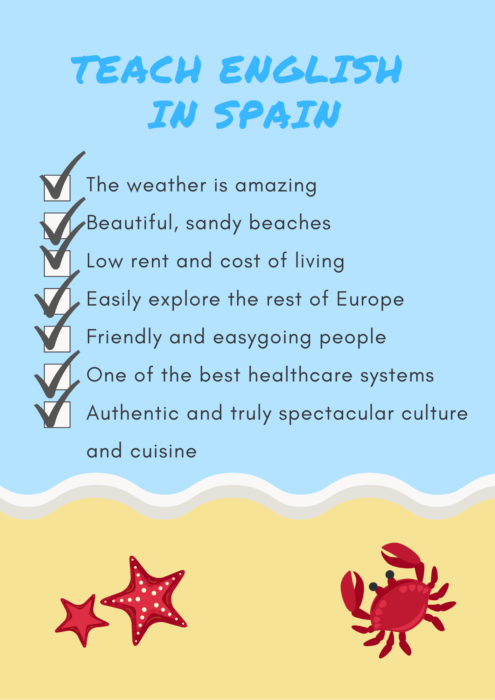Disclosure: This article may contain affiliate links, meaning that when you make a purchase, I earn a small commission. Affiliate links cost you nothing to use and help keep my content free. For more info, see the Disclosure Policy.
Spain is a very popular destination for teaching English abroad. In fact, it was the first country I traveled to when I began my TEFL journey (please excuse the baby face — I was nineteen at the time).
Why teach English in Spain first of all? Well…

All I had was a TEFL Certificate and some savings to my name as I landed safely in Spain. I had arranged a job before arrival. With no degree or other qualifications, I set off on a new adventure teaching English at a summer school.
I’m going to explain the experience in more detail below so you know what to expect when teaching English abroad in a foreign country like Spain and use the information to find out if this is something for you.
Completing My TEFL Course
I started by completing a TEFL course at The TEFL Academy. The course also provided me with many benefits, such as job support.
Nowadays, this course has evolved into a 168-hour course and gives you a bonus ‘top-up’ course, such as a Business English course or Teach English Online course.
You don’t have to complete these courses, but they are also nice to have should you want additional training and certification to add to your resume.
Teach English in Spain, Arrasate
Less than a week after completing my TEFL course, I found a summer job in Arrasate, the north of Spain.
The north and south of Spain are quite different, so it’s worth knowing and understanding the culture before you arrive.
I was completely ignorant of the history and the differences between north and south Spain.
Spain is the second-largest country in Europe, with a rich, vibrant culture and a slower pace of life.
Tourists flock to the South of Spain, typically where the Spanish stereotypes come from; the paella dishes, the tapas, and the Flamenco dance.
The weather is also generally warmer in the south than in the north of Spain, and more people speak English in the more tourist regions of Spain.
If you decide to teach in an inland region of Spain with few foreign visitors, it might be useful to learn some basic Spanish, as some Spaniards cannot communicate much in English.
Basque is also spoken in the northern region of Spain, which is different from Spanish, but they will still understand you if you speak Spanish to them.
Check out this article to find more things you didn’t know about the Basque culture.
I can still remember some Basque words/phrases five years later, the kids drilled them into me, and I felt it was important to them that I could say something!
You do NOT need to know Spanish to teach in Spain. However, it may be handy to learn a few phrases if you plan to stay there long term

For English Language Teachers or Those Looking to Get Started…
Teacher tips, new teacher checklist, teacher planner, and notes. Subscribe for ESL News, jobs, and more!
Some places you might like to visit in the north of Spain:
If you want to see the north of Spain, you should look out for:

Camino De Santiago
The Camino De Santiago is a famous pilgrimage hike leading to a shrine of the apostle St.James.
Thousands of people come together to do this hike, and you will meet many people from other countries staying in hostels and attempting the journey, which can take up to five weeks, depending on where you start.
The Camino Del Norte trail begins in San Sebastian in Spain and brings you to Santiago. There are many gorgeous beaches and scenic towns to see along the way.
I talked to others completing the Camino De Santiago at a hostel I had ventured into, and they were very friendly and enlightened by the whole experience, getting up in the early hours to start walking
Some complete the Camino for spiritual reasons, while others experience it for its culture, heritage, or challenge.

Madrid
Madrid is an impressive city, boasting many art galleries and museums. See historical sites such as the Royal Palace or explore its many flea markets and vintage stores.

Barcelona
Barcelona is home to some breathtaking architectural sites on the northeast coast of Spain.
Look at the basilica, the Sagrada Familia, or parade through the streets called Las Ramblas. You can find many delicious restaurants, interesting shops, and street performers here.
While I was in summer school, I had little time to look around during my short stay, I highly recommend taking the day to see around and soak up the majestic sites Spain has to offer.
The South of Spain also has a lot to offer, and you can find some really great locations.
Some places you might like to visit in the south of Spain:
If you want to visit the south of Spain, consider visiting:

The Alhambra
The Alhambra is a mystical palace and fortress located in Granada, Spain.
The Alhamra has a rich history and is well worth the guided visit, telling the story of its construction, the vicious battles, and the city’s conquerors.

Seville
Fall in love with the flamenco dance in Seville, the capital of Andalusia.
Experience first-hand the guitarists, the amazing movement of the dancers, and the entertaining shows.
There are also a lot of historical sites, such as the Alcázar castle complex and the Plaza de Toros de la Maestranza bullring.

Marbella
Marbella is a popular destination for its sandy beaches, night clubs, and expensive yachts, made famous by the elaborate movie stars and opulent mansions by the waterfront.
There is no shortage of places to party at Marbella.
If you want to find out more great things to do in Spain, I recommend following Cat’s adventures, a blog about a Chicago girl who uprooted her old life and moved to Spain as a teacher: Sunshine and Siestas
How Do you Apply for Jobs in Spain?
I found my job by applying via the TEFL.com website.
This is a beneficial resource for job listing, and they will send you notifications if your profile matches a particular job offering.
There are other sites where you can find a job in Spain, too, such as ESL Starter.
You can sort the jobs by location and apply to the ones most suitable for you.
The TEFL Academy will help you with your CV should you decide to take their TEFL course.
You will most likely receive an interview on Skype or Zoom and will be notified about your job details and place of stay.
Oftentimes, English teaching jobs come with affordable accommodation to help you get set up.
August may be a slower time to apply for jobs, as many Spaniards take some time off for vacation.
Generally speaking, an excellent time to apply for jobs is from January to March before the next school year starts. You could also apply around May or June to summer schools and find opportunities to work long-term there when the summer school work ends.
You can find a job in a public or private school and even hold your own private classes if you want to make more money.
You can advertise on sites like this one or gain students through word-of-mouth referrals. Another smart option is to do some online teaching if you find that you have time to do so.
Hack: Become a Language Assistant
If you don’t want to dive straight into teaching but still want an excuse to travel, why not try being a language assistant?
This allows you to:
- Teach without any program fees
- Gain teaching experience as a language assistant working 20-hours per week
- Earn 912 euros per month for a comfortable lifestyle
- Free or low-cost accommodation
If you want to become a language assistant in Spain, check here for more details.

Teaching English in Spain Requirements
Spain doesn’t necessarily require a degree to teach English, but it can help.
When I worked in Spain, I didn’t have a degree, but they appreciated having a native English speaker as a teacher. So if you are a native English speaker and have a TEFL certificate, you can certainly find a job in Spain.
You will also need to consider your VISA type when entering Spain.
If you are from the EU, you can work without a work permit. However, almost everyone else needs one, including American citizens.
It is the employer’s responsibility to apply for one on your behalf, so when you are offered a job, you can look into applying for a work visa. You can find more information about visas for Spain here.
How Much Can You Make Teaching English in Spain?
With Spain’s low cost of living and fewer teaching hours, teachers who teach English can expect to make somewhere between $800-$1100 if they are working through a program or $1700-$2250 per month working at a private school.
You could teach anything from 12 to 25-hour workweeks, with more hours available in a private school. You can make a little extra cash by teaching online or by offering your own private classes.
If you want more details about Spain and teaching there, check out the Go Overseas website for more information. With the growing demand for English teachers, you are bound to find a job overseas in no time!
Cost of Living in Spain
You can check out the fees for living in Spain here. You can sort by city and find an estimation of the costs.
You will also want to consider the benefits you receive as a teacher, such as lower-cost accommodation and access to healthcare.
You will not need a car, as there are public transport facilities and most places in towns and cities are accessible on foot.
To earn a little more monthly, consider getting private clients or teaching online. This is flexible and will give your income a little boost.
Teaching English in Spain Tips
- Be Friendly: Talk with the locals, even if it’s just the bartender or the shop assistant. They can teach you a lot about the surrounding area
- Get to Know the Culture: Embrace the Spanish traditions; such as football, the festivals, and the siestas
- Get to Know the Local Dialect: Familiarize yourself with the different Spanish accents and local dialect if you plan on living there long term
- Save Money: Have some savings before you arrive in Spain, as you may need to do some in-person interviews before you secure a job
- Travel to the Different Cities: Every city in Spain is different; be open to the change in lifestyle
- Accept the Challenges: Enjoy the Spanish adventure and eat lots of savory tapas for me!!
Spain is a beautiful country, and you need to see it at least once! Be sure to stay open-minded and Spain has quite unique and fascinating culture.
Spain is a country that has a lot to offer foreign teachers, and they love having English speakers who can help them with the lengua.
Teaching English is not for everybody, but if you want to travel abroad and see another part of the world, this is a viable way of doing it while saving a little money.
Conclusion
Spain offers diverse experiences, with different distinctions and cultural traits from north to south. Get to know what Spain offers, and decide where you want to go!
With fewer teaching hours, you will have time to explore Spain, integrate with the local community, learn a few phrases en Espanol, and enjoy the delightful atmosphere.
Got questions or like this post? Please leave a comment below!

Useful Links
- Teach English abroad locations
- Teach English online 2020
- How To Make Money as an English teacher
- Why I Teach English and Love it
Caitriona Maria is an education writer and founder of TPR Teaching, crafting inspiring pieces that promote the importance of developing new skills. For 7 years, she has been committed to providing students with the best learning opportunities possible, both domestically and abroad. Dedicated to unlocking students' potential, Caitriona has taught English in several countries and continues to explore new cultures through her travels.



